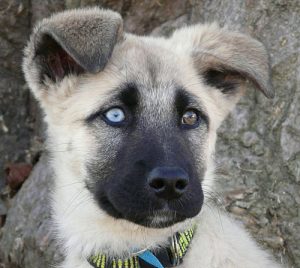
You may have noticed that German Shepherds, as with many dogs, tend to have brown eyes. You may have wondered if this is a standard trait that never varies, or whether German Shepherds ever have blue eyes. Perhaps you even saw a dog once with blue eyes that otherwise resembled a German Shepherd, but you weren’t sure of the breed due to the animal’s eye color.
Can German Shepherds Have Blue Eyes?
It is very rare, but due to a genetic variation, yes, adult German Shepherd Dogs can indeed have blue eyes. The vast majority of adult German Shepherds have a brown eye color. Mixed dogs may have blue eyes as well.
Although most breeders consider the trait a fault, many dog owners find the trait an attractive quality.
This blue-eyed trait occurs in a variation of the breed known as “blue German Shepherds.”
Blue German Shepherds

German Shepherds with blue eyes, but which also feature traditional markings, are often called Blue German Shepherds. This is not only because their eyes often stay blue even after adulthood, but because the recessive gene that causes the blue eye color can also cause the darker patches of hair on the animal to appear more blue or silver in hue rather than the usual black.
There are three possible variations in the coloring for Blue German Shepherds, including: blue and tan, blue and dark brown (also known as sable,) and blue and black. The blue and black variation often appears as an overall dark gray or bluish gray.
The gene responsible for this color variation is sometimes referred to as the “double blue gene” or the “liver recessive gene.” The presence of this gene causes the pigmentation in the hair that would normally be black to appear diluted, and thus more blue, silver or gray in hue.
The same gene causes the diluted pigmentation in the eyes, which can cause a blue GSD to have eyes that are blue, pale brown or yellow.
Is There Something Wrong With Blue GSD’s?
The color variation in eyes and hair in blue GSD’s is caused by a recessive gene. The same type of gene variation occurs in humans, causing different hair colors and eye colors.
Some dogs, such as the Doberman, can suffer from skin conditions due to the same recessive gene, but as far as is known, there are no health problems or other defects associated with the recessive gene that causes blue eyes in German Shepherds.
Many breeders wish to avoid mating animals with this gene where possible, especially if they want to sell dogs that will be shown because the AKC will disqualify blue German Shepherds from shows.
However, as with all German Shepherd dogs, this variation in breeding does nothing to disqualify the animal from being a healthy, beautiful pet for the average dog owner. Who doesn’t love a blue-eyed boy–or girl dog?







